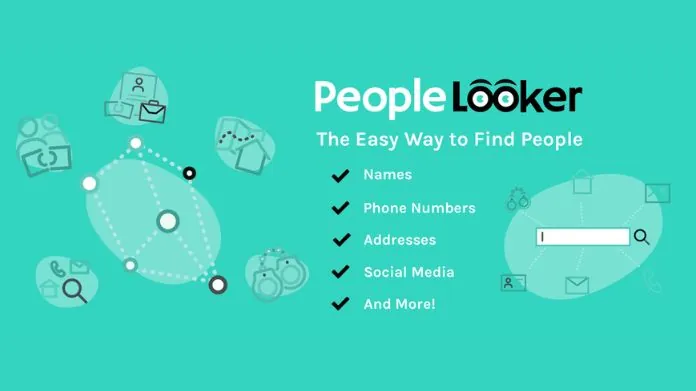In our interconnected world, information is power. Whether you’re reconnecting with an old friend, vetting a potential business partner, or simply curious about someone you’ve just met, access to reliable background information can be invaluable.
That’s where PeopleLooker comes into play. This PeopleLooker review aims to provide a thorough analysis of PeopleLooker, a widely used online service that guarantees to deliver extensive details about individuals within seconds.
From criminal records to contact details and social media profiles to financial history, PeopleLooker claims to offer a one-stop solution for your background-checking needs.
Embark on a journey with us as we uncover the features, accuracy, pricing, and user experience of PeopleLooker.
In a world where information is often elusive, PeopleLooker endeavors to bring it to your fingertips.
Table of Contents
Exploring PeopleLooker: A Game-Changer in the World of Online Searches
 Uncover a comprehensive procedure for investigating People Looker-
Uncover a comprehensive procedure for investigating People Looker-
- Introduction: Begin by introducing the topic and the service you’re reviewing. In this case, you’re exploring People Looker as a game-changer in the world of online searches. Provide a brief overview of the significance of online searches and the role People Looker aims to play.
- Background on Online Searches: In this section, provide some context about the importance of online searches in today’s digital age. Discuss how individuals use online search tools to find information about people for various reasons, such as personal connections, business dealings, or safety concerns.
- Introduce PeopleLooker: Detail what People Looker is and what it offers. Explain its core features, such as background checks, contact information lookup, and social media profiling. Mention its promise to revolutionize online searches and why it has garnered attention.
- Features and Capabilities: Dive into the specifics of People Looker’s features and capabilities. Discuss how it conducts background checks, sources its data, and the types of information it provides. Highlight any unique features that set it apart from other online search tools.
- User Experience: Share insights into the user experience of using People Looker. Discuss its user interface, ease of navigation, and overall user-friendliness. Include any notable pros and cons based on user feedback or your personal experience.
- Effectiveness: Evaluate the effectiveness of People Looker in delivering accurate and reliable information. Discuss its accuracy in providing background checks and other data. Share any success stories or limitations in the service’s capabilities.
- Pricing and Plans: Provide information about the pricing structure and available plans for People Looker. Discuss whether the cost aligns with the value it offers. Mention any free trials or special offers that potential users should be aware of.
- Privacy and Ethical Considerations: Acknowledge the importance of privacy and ethical considerations when using online search tools like People Looker. Highlight any guidelines or best practices for using such services responsibly.
- User Reviews and Testimonials: Include snippets of user reviews and testimonials, if available, to provide a broader perspective on People Looker’s performance and reputation.
- Conclusion: Summarize your findings and insights about People Looker as a game-changer in the world of online searches. Offer your final thoughts on whether it lives up to its promise and the value it brings to users.
- Call to Action: End your article with a call to action, such as encouraging readers to try People Looker or explore other similar services for their online search needs.
A Step-by-Step Guide: Opting Out of PeopleLooker
Constraints When Using PeopleLooker Review
In order to provide an objective and accurate assessment, it is important to acknowledge the limitations associated with reviewing a service like PeopleLooker.
When conducting a review of a service like PeopleLooker, there are several limitations that should be acknowledged to provide a balanced and accurate assessment.
Here are some common limitations of a PeopleLooker review:
- Data Accuracy and Completeness: PeopleLooker relies on publicly available data sources, and the accuracy and completeness of the information it provides can vary significantly. Reviewers may not have access to the most up-to-date or comprehensive data, leading to potential inaccuracies in their assessments.
- Data Privacy and Legal Considerations: Reviewers may not have the legal expertise to fully understand the privacy and legal implications of using services like PeopleLooker. Privacy laws and regulations can vary by jurisdiction, and it’s essential to consider the ethical and legal aspects of accessing personal information.
- Limited Scope: PeopleLooker primarily focuses on providing publicly available information, which may not include certain types of data, such as sensitive financial or medical records. Reviewers may not be able to assess the absence of specific data points accurately.
- User Experience Variability: User experiences with PeopleLooker can vary widely depending on factors like the user’s location, the quality of available data sources, and changes in the service’s interface. Reviewers may not be able to replicate all possible user scenarios.
- Opt-Out and Privacy Concerns: While reviewers may mention the opt-out process, they may not fully explore the challenges and complexities of opting out of data aggregator services. Privacy concerns related to the service’s practices may not be thoroughly addressed.
- Limited Access to Premium Features: PeopleLooker often offers both free and premium features. Reviewers may have access to limited features or a trial version, which may not represent the full range of services and capabilities available to paid subscribers.
- Bias and Subjectivity: Reviewers’ personal biases, preferences, and experiences can influence their assessments. It’s essential to consider multiple reviews and sources to obtain a well-rounded perspective on PeopleLooker’s performance.
- Changing Service Features: Online services like PeopleLooker can evolve over time, introducing new features, pricing models, or changes in data sources. A review may become outdated as the service evolves, making it essential to verify information with the service’s official website.
- Lack of Control Over Data Sources: Reviewers typically do not have control over the data sources used by PeopleLooker. They cannot verify the accuracy or completeness of the data provided by these sources independently.
- Conflict of Interest: In some cases, reviewers may have affiliations or financial interests that could bias their reviews. Readers should be aware of potential conflicts of interest when assessing the credibility of a review.

 PeopleLooker operates as an online data aggregation service that compiles publicly available information about individuals from various sources.
PeopleLooker operates as an online data aggregation service that compiles publicly available information about individuals from various sources.



